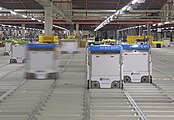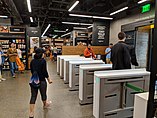"Fourth Industrial Revolution", "4IR", or "Industry 4.0"[1] is a neologism describing rapid technological advancement in the 21st century.[2] It follows the Third Industrial Revolution (the "Information Age"). The term was popularised in 2016 by Klaus Schwab, the World Economic Forum founder and executive chairman,[3][4][5][6][7] who asserts that these developments represent a significant shift in industrial capitalism.[8]
A part of this phase of industrial change is the joining of technologies like artificial intelligence, gene editing, to advanced robotics that blur the lines between the physical, digital, and biological worlds.[8][9]
Throughout this, fundamental shifts are taking place in how the global production and supply network operates through ongoing automation of traditional manufacturing and industrial practices, using modern smart technology, large-scale machine-to-machine communication (M2M), and the Internet of things (IoT). This integration results in increasing automation, improving communication and self-monitoring, and the use of smart machines that can analyse and diagnose issues without the need for human intervention.[10]
It also represents a social, political, and economic shift from the digital age of the late 1990s and early 2000s to an era of embedded connectivity distinguished by the ubiquity of technology in society (i.e. a metaverse) that changes the ways humans experience and know the world around them.[11] It posits that we have created and are entering an augmented social reality compared to just the natural senses and industrial ability of humans alone.[8] The Fourth Industrial Revolution is sometimes expected to mark the beginning of an imagination age, where creativity and imagination become the primary drivers of economic value.[12]
- ^ Bai, Chunguang; Dallasega, Patrick; Orzes, Guido; Sarkis, Joseph (1 November 2020). "Industry 4.0 technologies assessment: A sustainability perspective". International Journal of Production Economics. 229: 107776. doi:10.1016/j.ijpe.2020.107776. ISSN 0925-5273. S2CID 218941878.
- ^ Ross, Philip; Maynard, Kasia (2021). "Towards a 4th industrial revolution". Intelligent Buildings International. 13 (3): 159–161. doi:10.1080/17508975.2021.1873625.
- ^ McGinnis, Devon (27 October 2020). "What Is the Fourth Industrial Revolution?". The 360 Blog from Salesforce. Retrieved 22 January 2023.
- ^ "The Fourth Industrial Revolution will be people powered | McKinsey". www.mckinsey.com. Retrieved 22 January 2023.
- ^ Signé, Njuguna Ndung'u and Landry (8 January 2020). "The Fourth Industrial Revolution and digitization will transform Africa into a global powerhouse". Brookings. Retrieved 22 January 2023.
- ^ Marr, Bernard. "Why Everyone Must Get Ready For The 4th Industrial Revolution". Forbes. Retrieved 22 January 2023.
- ^ Park, Hyeoun-Ae (10 November 2016). "Are We Ready for the Fourth Industrial Revolution?". Yearbook of Medical Informatics (1): 1–3. PMC 5171547. PMID 27830223.
- ^ a b c Philbeck, Thomas; Davis, Nicholas (2018). "The Fourth Industrial Revolution". Journal of International Affairs. 72 (1): 17–22. ISSN 0022-197X. JSTOR 26588339.
- ^ "Regulation for the Fourth Industrial Revolution". UK Gov Department for Business, Energy & Industrial Strategy. 11 June 2019. Retrieved 18 November 2021.
- ^ November 2019, Mike Moore 05 (5 November 2019). "What is Industry 4.0? Everything you need to know". TechRadar. Retrieved 27 May 2020.
{{cite web}}: CS1 maint: numeric names: authors list (link) - ^ Lee, MinHwa; Yun, JinHyo; Pyka, Andreas; Won, DongKyu; Kodama, Fumio; Schiuma, Giovanni; Park, HangSik; Jeon, Jeonghwan; Park, KyungBae; Jung, KwangHo; Yan, Min-Ren (21 June 2018). "How to Respond to the Fourth Industrial Revolution, or the Second Information Technology Revolution? Dynamic New Combinations between Technology, Market, and Society through Open Innovation". Journal of Open Innovation: Technology, Market, and Complexity. 4 (3): 21. doi:10.3390/joitmc4030021. hdl:11563/139044. ISSN 2199-8531.
- ^ Recke, Martin (June 2019). "Why imagination and creativity are primary value creators". SinnerSchrader Aktiengesellschaft.



